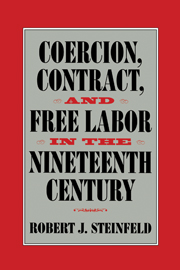Book contents
- Frontmatter
- Contents
- List of Illustrations and Tables
- Acknowledgments
- Introduction: Free Wage Labor in the History of the West
- PART ONE AMERICAN CONTRACT LABOR AND ENGLISH WAGE LABOR: THE USES OF PECUNIARY AND NONPECUNIARY PRESSURE
- 1 “Free” Contract Labor in the United States: An Anti-essentialist View of Labor Types I
- 2 “Unfree” Wage Labor in Nineteenth-Century England: An Anti-essentialist View of Labor Types II
- 3 Explaining the Legal Content of English Wage Labor
- 4 Struggles over the Rules: The Common Law Courts, Parliament, the People, and the Master and Servant Acts
- 5 Struggles under the Rules: Strategic Behavior and Historical Change in Legal Context
- 6 Struggles to Change the Rules
- 7 Freedom of Contract and Freedom of Person
- PART TWO “FREE” AND “UNFREE” LABOR IN THE UNITED STATES
- Conclusion
- Index
3 - Explaining the Legal Content of English Wage Labor
Published online by Cambridge University Press: 06 July 2010
- Frontmatter
- Contents
- List of Illustrations and Tables
- Acknowledgments
- Introduction: Free Wage Labor in the History of the West
- PART ONE AMERICAN CONTRACT LABOR AND ENGLISH WAGE LABOR: THE USES OF PECUNIARY AND NONPECUNIARY PRESSURE
- 1 “Free” Contract Labor in the United States: An Anti-essentialist View of Labor Types I
- 2 “Unfree” Wage Labor in Nineteenth-Century England: An Anti-essentialist View of Labor Types II
- 3 Explaining the Legal Content of English Wage Labor
- 4 Struggles over the Rules: The Common Law Courts, Parliament, the People, and the Master and Servant Acts
- 5 Struggles under the Rules: Strategic Behavior and Historical Change in Legal Context
- 6 Struggles to Change the Rules
- 7 Freedom of Contract and Freedom of Person
- PART TWO “FREE” AND “UNFREE” LABOR IN THE UNITED STATES
- Conclusion
- Index
Summary
CONFLICT, INTERESTS, IDEAS, AND NORMS
To the extent that an explanation has been offered by some labor historians for the rule that authorized criminal sanctions to enforce labor agreements, it is that criminal sanctions served the interests of English employers. During the eighteenth century, at a time when the English economy grew rapidly, the demand for labor intensified and Parliament enacted a series of statutes making penal sanctions available to employers for breaches of labor contracts. The problem of labor scarcity was not limited to the colonial periphery but posed difficulties for employers even in the midst of the general labor abundance of a developed market economy. Does the governing elite's response to scarce labor then account for the existence of penal sanctions in England?
Labor scarcity cannot be the entire explanation because it does not seem to have been either a necessary or a sufficient condition for the existence of penal sanctions. Penal sanctions were employed in England for centuries during long periods in which labor was in quasi-permanent surplus. In the nineteenth century employers continued to use penal sanctions with reduced frequency even at times when labor was not in great demand, during troughs in the trade cycle. They did so because there were economic advantages to be derived from using sanctions even under those circumstances.
If labor scarcity was not a necessary condition for the existence of a rule of penal sanctions, it was also not a sufficient condition. Labor markets might be tight, but any particular state might be unwilling to accommodate employers. The government of the United States, for example, failed to authorize stringent remedies to enforce contract labor agreements during the Civil War.
- Type
- Chapter
- Information
- Coercion, Contract, and Free Labor in the Nineteenth Century , pp. 85 - 101Publisher: Cambridge University PressPrint publication year: 2001

